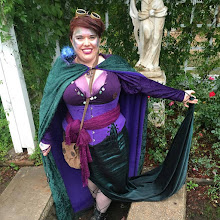Book Info:
The Complete Maus by Art Spiegelman. Knopf Doubleday Publishing Group, 1996.
Summary:
A comic presentation of a true story of survival and family issues, Art Spiegelman determined to record his father's story of survival during World War II in a cartoon form. But it is not only Vladek Spiegelman's story; it is also his son's story of trying to come to terms with his father's survival and how it has affected how he handles life and his family. But instead of portraying everyone as people, something readers might expect, he portrays the Jews as mice and the Nazis as cats. Part history, part biography, part suspense story, and part cartoon, this book is all the more interesting for appearing to be nothing more than a comic about mice and cats.
My Take:
I really loved this book. I've long been a fan of graphic novels and comics (read Archie and Jughead all the time as a kid, not to mention the X-Men and other comics as I progress), but to read one that is a true story and yet told in such a remarkable and strange, allegorical way was a real treat. I had no idea graphic novels could be so affecting, so interesting, and so real, all while still maintaining a cartoon experience. A brilliant tale within a tale, Art's story of working through his problems with his dad all while telling his father's tory was one of the most interesting bits.
Reviews:
School Library Journal (May 01, 1987 ; 0-394-74723-2 )
YA Told with chilling realism in an unusual comic-book format, this is more than a tale of surviving the Holocaust. Spiegelman relates the effect of those events on the survivors' later years and upon the lives of the following generation. Each scene opens at the elder Spiegelman's home in Rego Park, N.Y. Art, who was born after the war, is visiting his father, Vladek, to record his experiences in Nazi-occupied Poland. The Nazis, portrayed as cats, gradually introduce increasingly repressive measures, until the Jews, drawn as mice, are systematically hunted and herded toward the Final Solution. Vladek saves himself and his wife by a combination of luck and wits, all the time enduring the torment of hunted outcast. The other theme of this book is Art's troubled adjustment to life as he, too, bears the burden of his parents' experiences. This is a complex book. It relates events which young adults, as the future architects of society, must confront, and their interest is sure to be caught by the skillful graphics and suspenseful unfolding of the story. Rita G. Keeler, St. John's School , Houston
Library Journal (December 01, 1991 ; 0-394-55655-0 )
Spiegelman's Maus, A Survivor's Tale (Pantheon, 1987) was a breakthrough, a comic book that gained widespread mainstream attention. The primary story of that book and of this sequel is the experience of Spiegelman's father, Vladek, a Polish Jew who survived the concentration camps of Nazi Germany during World War II. This story is framed by Spiegelman's getting the story from Vladek, which is in turn framed by Spiegelman's working on the book after his father's death and suffering the attendant anxiety and guilt, the ambivalence over the success of the first volume, and the difficulties of his ``funny-animal'' metaphor. (In both books, he draws the char acters as anthropomorphic animals-- Jews are mice, Poles pigs, Germans cats, Americans dogs, and French frogs.) The interconnections and complex characterizations are engrossing, as are the vivid personal accounts of living in the camps. Maus and Maus . . . II are two of the most important works of comic art ever published. Highly recommended, espe cially for libraries with Holocaust collec tions. See also Harry Gordon's The Shadow of Death: The Holocaust in Lithuania , reviewed in this issue, p. 164; previewed in Prepub Alert, LJ 7/91.-- Keith R.A. DeCandido, ``Library Journal''
Suggestions:
This is a great book for a book talk (I certainly used it for mine), but would also be good for teachers if they wanted to do a section on graphic novels and were afraid parents might accuse them of assigning frivolous reading material.


No comments:
Post a Comment